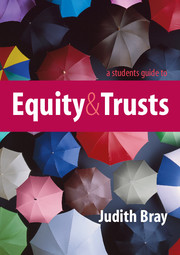Book contents
- Frontmatter
- Contents
- Preface
- 1 Historical introduction
- 2 Equitable remedies
- 3 The classification of trusts and powers
- 4 The three certainties
- 5 Constitution of trusts
- 6 Formalities for the creation of a trust
- 7 Private purpose trusts
- 8 Unincorporated associations
- 9 Resulting trusts
- 10 Constructive trusts
- 11 Trusts of the family home
- 12 Secret trusts and mutual wills
- 13 Charities; the Charities Act and the rules of cy près
- 14 Trustees: appointment, retirement and capacity
- 15 Duties and powers of trustees
- 16 Variation of trusts
- 17 Fiduciary duties and breach of fiduciary duties
- 18 Breach of trust and defences to breach of trust
- 19 Remedies against strangers to a trust
- 20 Tracing
- Index
2 - Equitable remedies
- Frontmatter
- Contents
- Preface
- 1 Historical introduction
- 2 Equitable remedies
- 3 The classification of trusts and powers
- 4 The three certainties
- 5 Constitution of trusts
- 6 Formalities for the creation of a trust
- 7 Private purpose trusts
- 8 Unincorporated associations
- 9 Resulting trusts
- 10 Constructive trusts
- 11 Trusts of the family home
- 12 Secret trusts and mutual wills
- 13 Charities; the Charities Act and the rules of cy près
- 14 Trustees: appointment, retirement and capacity
- 15 Duties and powers of trustees
- 16 Variation of trusts
- 17 Fiduciary duties and breach of fiduciary duties
- 18 Breach of trust and defences to breach of trust
- 19 Remedies against strangers to a trust
- 20 Tracing
- Index
Summary
Key points
historically common law remedies did not provide adequate compensation;
common law provided one remedy which was monetary compensation;
equity supplemented the common law by providing a broader range of remedies;
equitable remedies include injunctions: specific performance, rescission and rectification; and
equitable remedies are discretionary and are never awarded as of right.
Introduction: background to equitable remedies
One of the main criticisms of the early common law was the lack of flexibility in the type of remedy that it was willing to award. At common law the usual remedy was the award of damages but it was not always an adequate remedy. The claimant may have wished a type of behaviour to cease or perhaps he may have wished the defendant to act in a particular way. It was only when claimants petitioned the king that remedies other than damages began to be granted. The grant of these remedies was discretionary so the claimant had no assurance that the remedy would be granted. Equitable remedies are still awarded on a discretionary basis today. Since the fusion of common law and equity all courts are able to award equitable remedies.
- Type
- Chapter
- Information
- A Student's Guide to Equity and Trusts , pp. 12 - 31Publisher: Cambridge University PressPrint publication year: 2012



